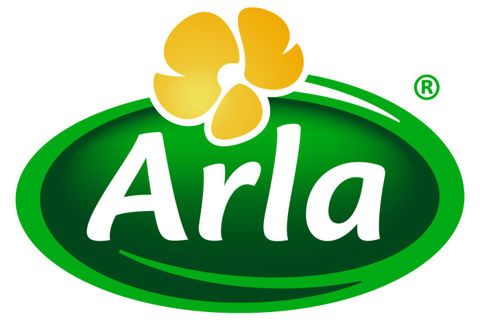The first half of 2011 was characterised by growth
- Read time:
- 4 min
- Published:
- 01 September 2011
- Contacts:
- Press contact
The keyword for Arla’s first half-year 2011 is growth. Revenue rose by 12 per cent, among other things due to the merger with Hansa-Milch and price increases in the market. Arla also delivered a large increase in the milk price to the cooperative members in Sweden, Denmark and Germany.
In the first half of 2011 Arla paid out DKK 1.2 billion more to its cooperative members as payment for their milk than in the first half of 2010. This represents an increase of 14 per cent in the Arla earnings.
The growth in revenue is related to Arla’s core markets – primarily Germany, where Arla merged with the German dairy Hansa-Milch earlier this year – and to the international growth markets, which also developed very positively during the half-year.
Revenue in the first half-year 2011 totalled DKK 27 billion, compared to DKK 24 billion in the first half of 2010. In Arla’s strategy for 2015 the goal is full-year revenue of DKK 75 billion, which is to be achieved via acquisitions, mergers and organic growth.
Growing sales in the Middle East
Peder Tuborgh, CEO”We present an interim result with a revenue increase and overall organic growth for the Group of approximately 7 per cent. While consumers in our key European markets are still exercising restraint due to the new economic crisis, we can note strong growth in our international markets, especially in the Middle East and North Africa, where revenue rose by 18 per cent,” says Arla Foods’ CEO Peder Tuborgh.
Sales of consumer-packaged milk powder are developing soundly in the Middle East and North Africa, as a result of Arla’s focus in recent years on developing a range of products with a high nutritional value, at a price that is affordable for the consumers in the area. Sales of processed cream cheese also show very strong growth. These products are sold to consumers under the Puck® brand, which commands a strong position in the Middle East.
Growth markets such as Russia and the USA also achieved fine growth rates in the first half of 2011.
The milk price rose
During the period Arla improved its Arla earnings significantly, primarily due to rising world market prices, which has made it possible to increase the milk price to the cooperative members very substantially. This is reflected by the Arla earnings, which are DKK 2.71/kg milk in the first half of 2011, compared to DKK 2.37/kg milk in the first half of 2010, and DKK 2.52 for the full year 2010.
Arla maintained the high payment in May and June, which therefore affects the interim result. The result is thus lower than for the same period of the previous year. This is because the funds have been paid out to the cooperative owners.
For the full year, Arla expects to achieve a profit of 2.5 per cent of revenue, or approximately DKK 1.3 billion.
Frederik Lotz, CFO“For the full year 2011, we expect a significant increase in the Group’s revenue and a net profit at the level of 2.5 per cent of revenue,” says Frederik Lotz.
“These expectations are subject to substantial uncertainty, however, due to the considerable global macroeconomic instability and the recent trend for falling global milk prices.”
An important step in the core market, Germany
In the first half-year Arla Foods achieved a significant breakthrough in the German market, with access to 80 million consumers.
This was achieved on the merger with the cooperative Hansa-Milch with approximately 650 members. This has expanded Arla’s cooperative ownership to include milk producers in Germany. Based on their milk, the dairy in Upahl, northern Germany, produces mainly milk, cream and yoghurt. These fresh milk products are an important supplement to Arla’s existing activities in Germany, which primarily comprised the sale of cheese (including Arla Buko®) and butter and blended products (mainly Arla Kærgaarden®) produced in Denmark.
The merger with Hansa-Milch is the first stage in the significant development of Arla’s activities in the German market. A further step was taken in July 2011, when Arla made an offer to purchase the southern German dairy Allgäuland Käsereien, which is supplied by around 1,800 milk producers.
General pressure on the Nordic market for dairy products
During the first half-year Arla’s sales of fresh products and cheese in the Nordic region were still affected by the repercussions of the economic crisis for consumers. In Finland, a tough price war is still raging in the dairy market, and in Sweden the retail market for dairy products is generally subject to pressure. This also affects Arla, and especially sales of yellow cheese are under pressure. On the other hand, sales of Arla’s lactose-free products are rising, especially to Swedish consumers.
In Norway, Arla successfully launched Starbucks® iced coffee and Rynkeby® juice. Both products are produced by the Arla Group.
Three strong brands
The three global brands Arla®, Lurpak® and Castello® have top priority in Arla’s strategy and its focus is on further boosting the brands’ profile and sales, so as to create new growth for Arla. Castello® was therefore re-launched in the first half of 2011 via an internationally-oriented campaign, a new design, and by introducing new cheeses under the House of Castello® brand. In overall terms, the market expanded by 15 per cent, Arla® grew by 14 per cent, and Lurpak® revenue increased by 21 per cent in the first half-year.
Arla Foods is an international dairy company owned by more than 8,400 farmers from Denmark, Sweden, the UK, Germany, Belgium, Luxembourg and the Netherlands. Arla Foods is one of the leading players in the international dairy arena with well-known brands like Arla®, Lurpak®, Puck® and Castello®. Arla Foods is focused on providing good dairy nourishment from sustainable farming and operations and is also the world's largest manufacturer of organic dairy products.
Press contact
